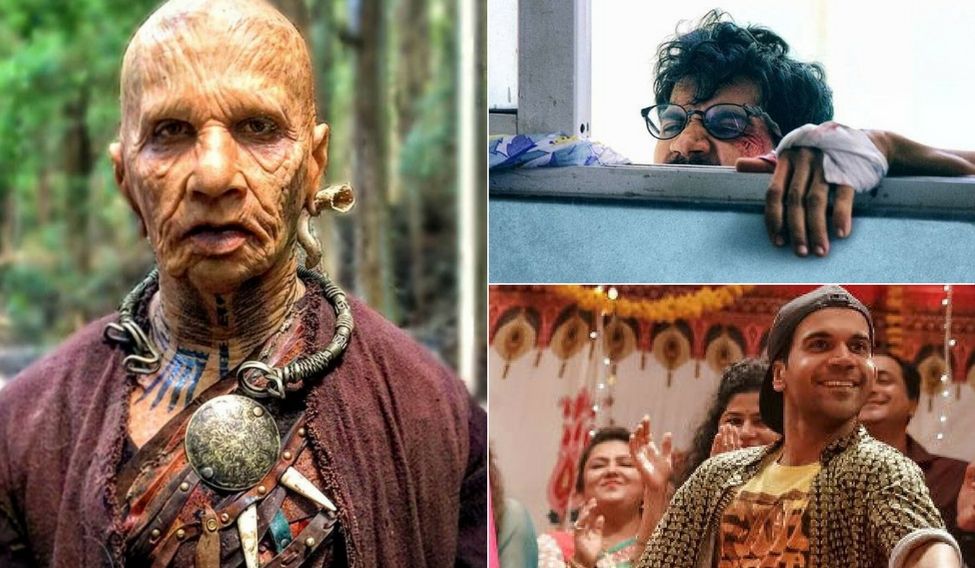Considering this article is going to be a lengthy ode to Rajkummar Rao, let's get the negatives done with. Probably the only ‘filmy, hero-type’ thing that Rao has bothered himself with is changing his name. Rajkumar Yadav became Rajkummar Rao overnight. All for numerology, and he blames his mother for it. Give him a benefit of doubt. For Shakespeare was right, Rao’s success had nothing to do with his name. It was all age-old method of sincerity backed by some solid hardwork.
Think about it, he is no uncha lamba kadd (tall figure), wasn't born into Bollywood royalty and didn't rely on luck. What started as a hobby during his school days, took a serious turn when he joined Film and Television Institute of India. A textbook struggling phase later, Rao's career was just about to turn into another cliché when his latent fate decided to look up and in 2017, Rao will be facing his busiest calendar yet. “The industry is flummoxed,” says Apurva Asrani, writer, and editor of some of Rao’s most notable films—Shahid and Aligarh. Remembering his debut film, Apurva remarks, “His character wasn’t heroic, not even where you feel any sympathy, but Rao still left a lasting impression.” And that impression would culminate in Anurag Kashyap recommending a relatively unknown boy to be cast in a movie that would go on to win him and his director Hansal Mehta a national award.
This year, Rao will be seen in at least five releases and now more than halfway through, he is already reaping benefits. Bareilly Ki Barfi, a movie which is technically led by Ayushmann Khurrana and Kriti Sanon, pleased the critics largely because of Rao. Skim through his Twitter and you will be hit by a deluge of compliments; Amitabh Bachchan’s handwritten note being the crowning glory amongst them. And the way he gushes in public to compliments big and small is what brings him down to your level—an actor with a face we all can connect to, doing characters we have encountered in our daily life.
Producer Ashwin Varde has witnessed Rao's rise since his first film. "He has never compromised on the quality of his work even during his struggling period, and in these years you will never see him being a part of a sub-standard film." But his roles aren’t just written that way. The way Rao internalised it made the difference. Asrani was already a fan, but he was really impressed when he was on the editing table, cutting the first scene from Shahid. “It was the scene where he runs to his house, his mom is inside and he bangs on the door. Rao is this vulnerable boy, stammering, attempting to speak but is incoherent. That wasn’t in the script but Rao made it his own and elevated the movie,” he shares. Rao is a favourite with the directors because of the exact same reason. He is hungry, but with no intention to change the narrative to suit his character sketch. This security is perhaps what saved him from being categorised as a serious actor.
Even in his commercial films, Rao shone effortlessly. Ashwin believes this is just the beginning. "His looks are unconventional, but history is proof, that is exactly the trait that has created the biggest of actors and stars." In Kai Po Che, a movie that was Sushant Singh Rajput’s launch, even made Rao a household name. There was no looking back since. He has played the hypocritical boyfriend in Queen, the victim in Dolly Ki Doli and was completely unrecognisable in Raabta. "He has an uncanny knack of standing out even in a crowd, thanks to his supreme talent. Now with commercial success his way, you can now see him in leading roles. He is made for that," adds Varde.
His talent is getting popular day by day. Producer Mauli Singh who has closely handled the publicity of his films in international festivals is astounded by the appeal. “The international market only recognises Priyanka Chopra and Aishwarya Rai Bachchan. However, Rao, with Shahid, Newton and now Omerta, is fast gaining ground.” It is not an easy arena. After Irrfan Khan and Nawazuddin Siddiqui, Rao seems to be the next in line. And while they are 50 and 43 respectively, Rao is only 32 years old.
Rao found an advantage in factors others would have lamented about. He has no special physical features and that became his specialty. He is a victim-turned brave lawyer, a jerk-next-door, an immigrant desperate for luck, the abusive husband, a young naïve journalist, a pitiful shy salesman with anger issues and a radical terrorist capable of international infamy.
To go by his filmography, he has much more in store. Playing a transgender in Ami Saira Bano, Rao will be venturing into regional cinema. There is already a Hollywood film, 5 Weddings, ready to release and another, Love Sonia, has been announced. Then there is Fanney Khan, with Aishwarya Rai Bachchan, a big budget venture and a sharp contrast to his other movies. “It shows that Rao is in a coveted spot; a place where filmmakers of every sensibility are glancing at him, effectively bridging the gap between commercial and conceptual films," says Mauli. Apurva has an interesting anecdote to weigh that. “I didn’t think Rao would have agreed for the role of Deepu Sebastian in Aligarh (a movie Apurva wrote) . But he managed to bring out the best in Manoj Bajpayee as well. Even in Citylights, he understood that it was a film from the Bhatt camp and treated it that way. Rao is generous that way and doesn’t discriminate his co-workers or directors.”
With Newton up for release soon after Bareilly Ki Barfi hit the theatres, Rao is reaping benefits of his craft. He has only recently hired a management and a PR company, in an industry where that is the first priority before talent. Just in seven years, we are witnessing the rise and rise of Rajkummar Rao.






